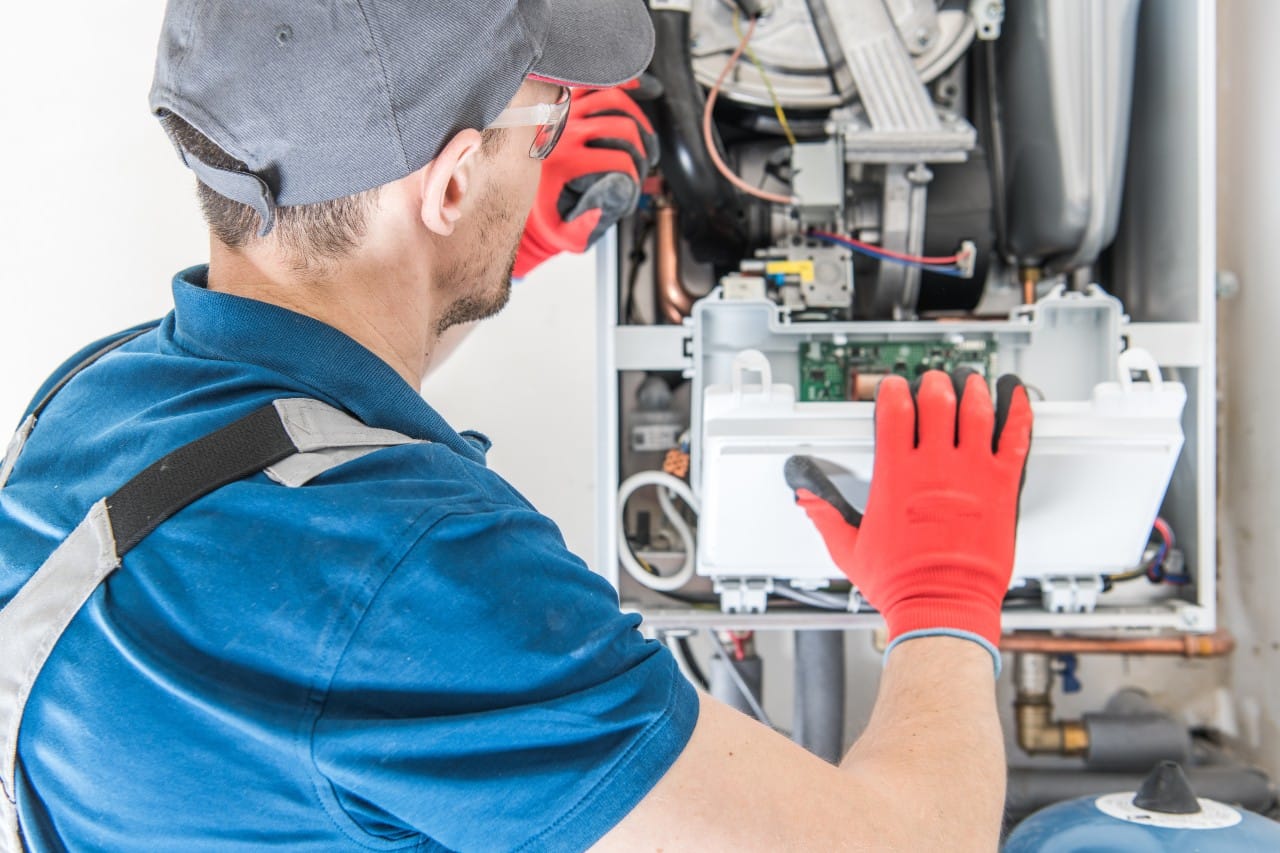
What is the Difference Between Gas or Electric HVAC Systems?
Whether it is gas or electric, both heating systems follow the same process to heat a home. The heat is created, blown into a cabinet, pushed through a heat exchanger, and then released throughout the house using ductwork.
The primary difference between the two systems is that first step, the process of generating heat. Gas heaters create that heat by burning gas, whereas electric heaters use electricity to manufacture the heat.
How to Identify If I Have Gas or Electric Heating?
There are two easy ways to determine if you have a gas or electric HVAC system. First, you can head on over to your heating unit. If it has a window where you can see a little blue flame inside, you have a gas HVAC system. An electric HVAC system does not need a flame or a window. So, if you were to see a flame on an electric heating system…that would be a reason to call the fire department.
Secondly, you can get an HVAC inspection. Annual inspections are recommended for all HVAC systems, whether gas or electric, to ensure the efficiency and safety of the equipment. When your next inspection rolls around, simply ask the inspector what system type you have, and they will explain your specific unit type, model, and what it means for you.
Why It Matters to Knows
You may be thinking, “I don’t care what type of HVAC system I have as long as I get what I need when I need it.” While you are one of many homeowners that feel this way, it is beneficial to your safety to know whether you have a gas or electric home HVAC system.
HVAC Furnace Safety First!
Being aware of your unit type, gas or electric, is critical for the safety of your home and your family. The National Fire Protection Agency reports that, from 2014 to 2018, heating equipment caused one in seven home structure fires equaling almost 50,000 fires, resulting in over 500 civilian deaths, and producing over $1 billion in property damage. Sadly, many of these devastating fires could have been prevented if homeowners had taken the proper precautions; don’t become yet another statistic!
What to Look for When Buying a New HVAC System
Choosing between a gas or electric HVAC system is a choice that relies significantly on personal preferences and your home’s location, with each system having its own pros and cons.
Gas furnaces have a higher heat efficiency, making them the more ideal choice for homes located in colder climates. Additionally, they have lower fuel requirements, which can save you money in the long run. On the flip side, they are more expensive to buy, install, and maintain. Plus, they produce more noise, require additional safety requirements, and typically last only 20 years.
Electric furnaces are the preferred choice for homes situated in warmer clients. Not only are they cheaper and easier to install and maintain, but they are safer, quieter, and can last up to 30 years. However, they are typically less heat efficient which means they create higher energy costs for you.
Which is Easier to Maintain, a Gas or Electric Furnace?
On average, electric furnaces are easier to maintain than gas furnaces. Since there are no burners to clean or inspect, the maintenance process is simpler and less expensive.
Gas furnaces, on the other hand, require more attention. They need regular cleaning and inspection to ensure safe operation. We also want to note that since gas heaters have an open flame, you are always at risk of a fire or carbon monoxide leaks. Therefore, it is critical to have specific safety precautions in place, such as smoke and carbon monoxide detectors.
Don’t Overlook Signs of Needed HVAC Repair!
Whether you choose a gas or electric furnace, proper maintenance is critical. Not only does it ensure the safety of your home, but it increases the efficiency of your unit. This efficiency will decrease your energy consumption, lower your utility bills, and prolong the lifespan of your unit.
If you notice any problems with your HVAC, you should not overlook them, but call in a professional immediately for inspection and repair. To schedule a service request with Apollo Heating & Air Conditioning, please click HERE.
Apollo Heating & Air Conditioning
Apollo Heating & Air Conditioning has been serving the Kennewick, Richland, Pasco, and Columbia Basin regions since 1981. We are committed to providing you with premium quality HVAC service, maintenance, products, and documentation. We are dedicated to earning the trust and confidence of our clients, so to build a long-term relationships and provide you with decades of HVAC care.
Please review our website and services for more information on Apollo Heating & Air Conditioning. Got questions? You can schedule a service request by filling out our form on our website, or you can give us a call at (509)-396-2653.





